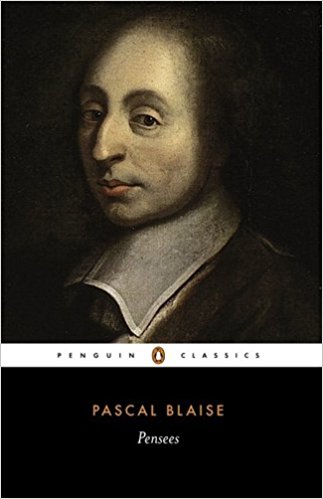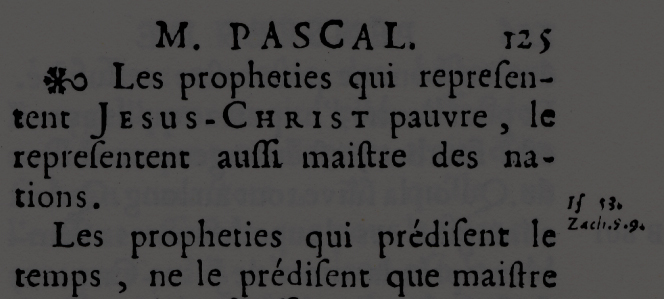The world of books is as deep as it is wonderous. It’s amazing how books written centuries ago can still start a spark in our modern minds. C.S. Lewis once said, “It is a good rule after reading a new book, never to allow yourself another new one till you have read an old one in between.” We recently asked our writing team to consider what book, not published in the last century, has most impacted their life? Today, Fredric Heidemann discusses the long-standing, philosophical work of Blaise Pascal.
Now and then, we come across a figure who is more relevant today than in his own time. In large part due to Peter Kreeft’s book Christianity for Modern Pagans, there is a growing recognition that Blaise Pascal fits that mold in the realm of Christian apologetics. A pioneer in mathematics and physics before the age of 30, Pascal’s brilliance was appreciated in other fields before he wrote about religion. His major apologetic work, the Pensées, is a collection of theological and philosophical thoughts. Pascal died before completing them, which he planned to organize into a comprehensive apologetic work called A Defense of the Christian Religion. What we get from Pascal is a “psychologization” of apologetics. Whereas the scholastic theology of St. Thomas Aquinas starts with abstract logical premises, like the rule of non-contradiction, the following Pensée could be considered Pascal’s premise: “The last act is tragic, however happy all the rest of the play is; at the last a little earth is thrown upon our head, and that is the end for ever.”
 It is classic Pascal. Grabs attention, registers an emotional response, and is a bit dark. Pascal believes mankind is perennially tempted to avoid confronting the obvious realities of human dysfunction (sin) and death. In the Pensées, he denounces such obtuse thinking and forces us to realize we need help while demonstrating that no mere human philosophy is capable of helping.
It is classic Pascal. Grabs attention, registers an emotional response, and is a bit dark. Pascal believes mankind is perennially tempted to avoid confronting the obvious realities of human dysfunction (sin) and death. In the Pensées, he denounces such obtuse thinking and forces us to realize we need help while demonstrating that no mere human philosophy is capable of helping.
To do this, Pascal illustrates the contradictions of human nature. As a species, we tend to be selfish, preoccupied with self-gratification and highly sensitive to others’ opinions of us. Moreover, if we examine ourselves fairly, we know we are personally guilty of this. We eat excessively while knowing that others are starving. We do things with barely a shrug that thoughtlessly endanger others (show me a single person with a smart phone who has never played with it while driving?). We gossip and judge others all too quickly and eagerly. We obsess over false projections of ourselves, gladly doing something cowardly if it would earn a reputation for bravery. Yet, we acknowledge that these things are morally wrong. According to Pascal, this is not a clash between the good guys and the bad guys, the righteous and the unrighteous, or the wise and the foolish. No, it is a contradiction in ourselves. We are all a strange mix of good and evil.
Pascal then condemns two very modern ways in which we deceive ourselves to avoid contemplating our final end and the great contradiction lurking within: diversion and indifference. Diversion is the busyness and pointless affectation where we flutter from one activity to another without reflection as to the activity’s real worth or our real end. “Men spend their time in following a ball or a hare; it is the pleasure even of kings.” Yet, as Pascal points out, “we would not take these as a gift.” We like the chase better than the quarry. This problem has ballooned in the era of smart phones. The device controls us rather than us controlling the device, and the proof is in the pudding. A recent article in The Atlantic discussed two studies concluding that screen time among teens is directly proportional to unhappiness, and attachment to social media actually causes (not correlates to) a sense of isolation.
Then there’s indifference: the anything-goes attitude, so pervasive in our own time, that discourages self-examination and encourages self-preoccupation.
For it is not to be doubted that the duration of this life is but a moment; that the state of death is eternal, whatever may be its nature . . . . On this point, therefore, we condemn those who live without thought of the ultimate end of life, who let themselves be guided by their own inclinations and their own pleasures without reflection and without concern, and, as if they could annihilate eternity by turning away their thought from it, think only of making themselves happy for the moment.
* * *
We do not require great education of the mind to understand that there is no real and lasting satisfaction; that our pleasures are only vanity; that our evils are infinite; and, lastly, that death, which threatens us every moment, must infallibly place us within a few years under the dreadful necessity of being for ever either annihilated or unhappy . . . . That is the end which awaits the most illustrious life in the world.
Pascal can be grim, but his seemingly cynical view has a classic Catholic both/and quality. Pascal reminds us that only humans can behave inhumanly. By comparison, a dog cannot behave indogly. But our unique wretchedness is matched with our unique greatness. Only humans can unlock the mysteries of creation through math, science, and philosophy. Only humans can grasp, albeit dimly, the mind of God. In other words, a fundamental disproportion and tension exists in each person. We were made for glory and divinization but fall far short of it. By exposing both the wretchedness and greatness of mankind, Pascal prepares the heart and mind to receive the Gospel message.
Some have remarked that Nietzsche’s nihilistic atheism was more successful in driving people into the arms of God than any apologist. That is because Nietzsche was honest enough to boldly proclaim the terrifying philosophical implications of existence without God. It is no accident that Nietzsche was Adolf Hitler’s favorite philosopher. Pascal’s strategy is similar. His goal is to bring the unbeliever to a point of hopeless confusion so that Jesus Christ the Redeemer is his only option for peace and sanity. He does this by showing that Christianity is uniquely suited to resolve the tensions, oddities, and disproportions of the human experience.
I’m convinced that resistance to religion in the modern secular world is more psychological than logical. The tired rhetoric of the New Atheists proves the point in many ways. Their arguments are poorly articulated versions of very old positions. What’s new is the psychological pull of polemic, propaganda, and packaging, which is precisely why the psychological overtones in the Pensées speak so well to it. Pascal sympathizes with the passionate agnostic who struggles daily with the ultimate question of whether God exists. But the sad fact is that most “nones” and agnostics are not passionate truth-seekers. In the end, far too many think, “Who cares? What does it really matter? How is this relevant to me? Religion is boring.” It is that emotional and psychological distance from spirituality that the Pensées seek to address. Intellectual uncertainty is understandable. Indifference to the question of God is insanity.
The issue reaches its climax in Pascal’s Wager. Like much of the other Pensées, the method is psychological, intending to burn a sense of discomfort in the mind of the unbeliever. The Wager’s fundamental assertion is that, in the end, the believer loses nothing even if he’s wrong while the unbeliever gains nothing even if he’s right but loses much if he’s wrong. Moreover, because the Wager was likely intended to be the capstone of the Pensées, it’s as though Pascal is saying, “after everything we’ve been through, after having read all that I have to say, after facing the bleakness of life without God, do you really want to bet your life against the possibility that He does not exist, gaining only a few more hours of time for pointless diversion and indifference?” The Wager is more a call for action than for philosophical amusement.
It was precisely that call to action that made an impact on me. I first encountered the Pensées in Kreeft’s Modern Pagans, which is essentially a selection of Pensées with commentary. I had entered the Church about four years before and was glad to be a member of the Catholic Club. On a cultural and intellectual level I was certainly Catholic, but I was not living my faith. I went about my life believing, like so many, that a God who loved me couldn’t possibly make any real demands on me. I was a first-year law student and preparing for my wedding the following summer. But then, six months before the wedding date, my then-fiancée told me she did not want to get married and broke up with me. It hit me like a ton of bricks. On top of that, it was the height of the Great Recession, and I was inundated daily with depressing statistics about law grads’ poor job prospects. Dutifully continuing my studies despite a sense of futility and carrying the sting of heartbreak, I found respites of peace by exploring my faith.
Along with other spiritual reading around this time, the Pensées were instrumental in what was a sort of second conversion that inspired me to live a Christian lifestyle for the first time. It is difficult to pinpoint exactly why, but I think it was because Pascal forced me to face the real reason for my sadness: I was not close to God. Pascal was right. Our pointless busyness combined with our tendency to let our happiness depend on people and events we have no control over is truly a recipe for misery and distracts us from what is, in the end, the only important thing. Moreover, I had unconsciously imbibed much secular thinking about Christianity, particularly about sin. Despite the clear evidence all around us, the secular world tends to deny sin. The result is that Christianity, even if it is otherwise appealing, will appear a bit foggy. Who needs a savior unless there is something to be saved from? The Pensées lifted that fog, allowing me to recognize that Jesus Christ wasn’t just an idea that I liked but a person who I needed.
Many converts give a beautiful witness to the truth of the Faith by offering some version of C.S. Lewis’s observation, “I believe in Christianity as I believe that the Sun has risen not only because I see it but because by it I see everything else.” Think of G.K. Chesterton likening Catholicism to the key that fits the mysterious lock we call mankind or Jennifer Fulwiler describing her discovery of Catholicism like “finding the owner’s manual to life.” But one could easily anticipate how subjectivism spoils the mood: “Well, that’s great it works for you, but it’s just not for me.” In my opinion, the Pensées greatest relevance for our time is to address precisely that. Christianity fitting like a glove isn’t just someone’s opinion. If we honestly examine the peculiarity of human beings and the peculiarity of Christianity, we find a match. We find the unique answer to the unique problem of human existence. So put the Pensées on your reading list. You will be glad you did, and, after sharing a few of Pascal’s observations, you just might be able to get him on the reading list of your favorite apathetic “none” as well.
